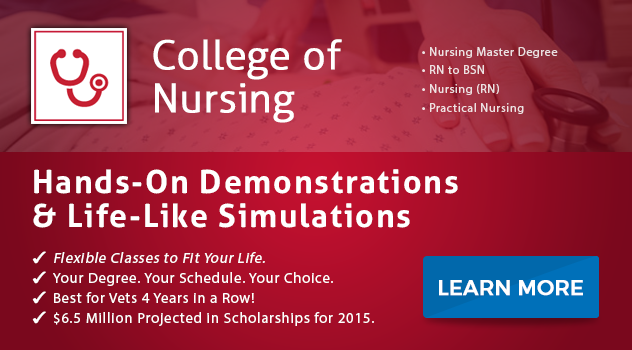
What do you Study in Nursing School?
To some enrolling in a nursing school, the curriculum can seem a little … distracting. Sure, courses like Anatomy & Physiology I with Terminology make sense, but why are you expected to sit in a College Composition course? What, exactly, do you study in nursing school and (more importantly) why?
Freshman Orientation for Nurses
Whether you just started nursing school, are recently out of high school, or are a veteran looking to change your direction, taking a Freshman Orientation course is a great way to learn your way around the professional registered nursing program. You can learn skills that may help you be successful both in school and in your new field. Entry-level nursing graduates should leave the course with a solid understanding of:
- Prioritizing work, your studies and personal self-care
- Classroom and clinical competencies
- Positive, failure-is-not-an-option mentality
- Goal setting and methods of accomplishment
- Time management
- Stress management
- Teamwork and collaboration
It may sound basic, but these foundational skills can help you in just about any venture. Nursing school is rewarding but difficult. You will face challenges you've never imagined, you will feel more exhausted than you ever have, and you will wonder at times whether it is all worth it. If you stick with it, you'll start to see the many, many rewards of life as a nurse. Working as part of a team forms bonds, caring for patients inspires compassion, and meeting goals is hugely satisfying. You could be someone's life saver, literally. We think that makes it all worth it.
Nursing Core Classes
As a candidate for becoming a Registered Nurse, you expect to take medical and science classes, and at a truly strong school you get a thorough, detailed background in all you need:
- Dosage calculations
- Pharmacology
- Concepts of nursing
- Maternal and newborn nursing
- Parent and child nursing
- Medical surgical nursing
- Acute care nursing
- Psychiatric nursing
Science Classes Needed to Become a Nurse
A quality nursing program will introduce students to the core competencies required for nursing. In addition to the skills and competencies needed for nursing, students may be surprised by some of the other courses included in their curriculum.
- Microbiology: Students are introduced to biological entities and basic biological principles as they apply to microorganisms, learning as you move through the course about microbial cultivation, control, metabolism, physiology, nutrition, structure and genetics, causes of human disease, and host responses to microbial invasion.
- Anatomy and Physiology with terminology: Levels 1 and 2 include laboratory time, taking an integrated approach to human anatomy and physiology, microbiology, pathology, and more.
- Nutrition: A science and medicine course that includes the function and structure of carbohydrates, lipids, proteins, water, vitamins, and minerals in the human body, this class provides every student with dietary guidelines and nutritional needs associated with the human life cycle and health, including nutritional therapy for various conditions and disorders.
Nursing Book Basics
In addition to these subject-area competencies, learning to communicate effectively spans two academic classes:
- College Composition: Everyone can benefit from improving their writing processes, developing critical thinking skills, and honing core writing skills required for academic and professional writing. This course gives nursing students the opportunity to review grammar and mechanics and apply knowledge of both as they compose academic essays.
- Principles of Communication: Nurses interact with patients, families, doctors, other nurses, and many medical professions; clear communication is a job must; you need the knowledge and skills necessary to communicate effectively in a wide variety of situations, as with colleagues, medical professionals, interpersonally, in small groups, and to the public.
Why All That?
If you recall your high school years, you could for the first time sign up for classes — electives — you wanted to take, rather than classes you had to take. You probably hope your post-secondary experience would mirror that, but, alas, you find you must take College Composition and Principles of Communication. Does a college or university know something you do not? Yes! We have found that students in all classes, including our dynamic and innovative nursing program, benefit from foundation-level classes that teach academic rigor.
Test Ready
You learn to be a better student when you take the Freshman Orientation class. You learn to be a better nurse when you practice communicating in various ways (public speaking, small groups, written essays, and more). You learn to write effective, strong compositions when you brush up on language and grammar basics.
Look for a school that values you as a person and a student. Quality post-secondary institutions concentrate on building skills, not simply filling desks. Ultimately, the school you choose should help you to take the NCLEX-RN exam and earn your place in an exciting, helpful entry level position as a registered nurse.
Are You Ready to Become a Nurse?
If you think you have what it takes to call yourself a nurse, consider ECPI University’s Associate of Applied Science in Nursing for the educational background you’ll need. With accelerated classes, you could find yourself becoming an RN in as little as 18 months with the option of working towards a BSN in as little as 12 additional months. For more information about this program, connect now with a helpful admissions counselor.
It could be the Best Decision You Ever Make!
DISCLAIMER – ECPI University makes no claim, warranty, or guarantee as to actual employability or earning potential to current, past or future students or graduates of any educational program we offer. The ECPI University website is published for informational purposes only. Every effort is made to ensure the accuracy of information contained on the ECPI.edu domain; however, no warranty of accuracy is made. No contractual rights, either expressed or implied, are created by its content.
For more information about ECPI University or any of our programs click here: http://www.ecpi.edu/ or http://ow.ly/Ca1ya.



